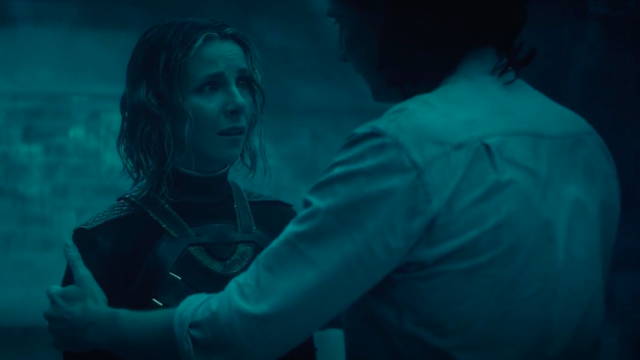Loki’s fourth episode, “The Nexus Event”, saw the god of mischief and his new ally Sylvie’s bond grow even stronger as the pair stared down their imminent destructions in one of the countless apocalypses taking place throughout the multiverse. Though the pair of Asgardians had found themselves in similar situations multiple times, this instance was different, and gave them reason to really think about what their crusade against the Time Variance Authority was really about.
Of course, Loki being about Loki and his many Variants, neither he nor Sylvie perished on the planet Lamentis-1, but “The Nexus Event” did end with one of them appearing to be taken off the playing board (at least for the time being) ahead of the season finale.

Before the prime Loki ends up getting pruned by Ravonna Renslayer and sent to a strange dimension where he meets four other Variants of himself, he and Sylvie share an emotional moment back at the TVA after taking out a number of soldiers, and one of the Time Keepers, all of whom are revealed to be robots of some sort. Faced with the idea that their entire fight to take the TVA was down, Loki turns to Sylvie in a moment of seeming hopelessness to tell her something important and heartfelt.
Though Loki doesn’t get a chance to say what he wants before he ends up getting pruned, everything about the way he grabbed Sylvie’s shoulders and stared into her eyes read as potentially more-than-platonic. A number of fans have balked at the idea of Loki featuring a romantic entanglement between Loki and a version of himself, particularly following series director Kate Herron confirming that Loki’s bisexuality won’t be explored further in the final two episodes. In a new in-house Marvel interview, Herron and Loki head writer Michael Waldron opened up a bit about the significance of Sylvie and Loki’s moment in “The Nexus Event” and how what’s going on between them is a bit more complicated that two narcissistic variants making googly eyes at one another.
According to Waldron, Loki was always meant to be a love story, but there was a bit of debate as to whether or not Loki’s romantic feelings should be for Sylvie specifically because the creative team wasn’t sure how it would play to audiences.
“We went back and forth for a little bit about, like do we really want to have this guy fall in love with another version of himself,” Waldron recounted. “But in a series that, to me, is ultimately about self-love, self-reflection, and forgiving yourself, it just felt right that that would be Loki’s first real love story.”
There’s still some debate as to whether Sylvie genuinely is another Loki or whether she might be the MCU’s take on the Enchantress from Marvel’s comics. As many similarities as there are between Loki and Sylvie, a long con meant to play to Loki’s innate tendency to think of himself (or versions of himself) as being interesting would certainly be in-character with a manipulative character like the Enchantress. But regardless of who Sylvie is specifically, Loki’s very much framed her as another dangerous Loki, not in name, but through her personality and the larger framing of her identity.
Herron expanded that, at least up to this point, Loki certainly sees Sylvie as one of his counterparts, and his feelings for her are, at least partially, informed by an understanding of who he’s been in the past.
“[Loki] sees things in Sylvie that he is like, ‘Oh, I’ve been there. I know what you feel,’” Herron said. “But she’s like, ‘Well, I don’t feel that way.’ And I think that was the kind of fun thing about it. She is him, but she’s not him. They’ve had such different life experiences. So just from an identity perspective, it was interesting to dig into that.”
Clearly, there is something going on in Loki’s mind as he looks at Sylvie in the final moments of “The Nexus Event” that feels like a new sort of emotion for him. Waldron wouldn’t go so far as to spell out that Loki wants to become an full-on item with her, but he did suggest that whatever that energy is, it’s something that the TVA thinks it should be afraid of.
“The look that they share, that moment, [it started as] a blossoming friendship,” said Waldron. “Then for the first time, they both feel that twinge of, ‘Oh, could this be something more? What is this I’m feeling?’ These are two beings of pure chaos that are the same person falling in love with one another. That’s a straight-up and down branch, and exactly the sort of thing that would terrify the TVA.”
